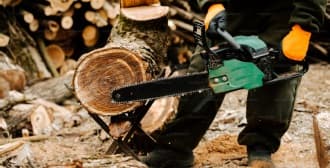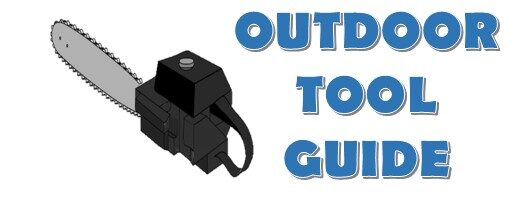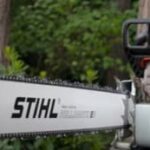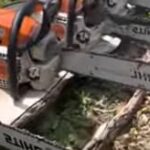As an Amazon Associate, this site earns commissions from qualifying purchases. For more information click here.
Chainsaws are powerful tools, essential for various tasks ranging from tree felling to woodworking. However, their roaring noise can be not just disruptive but potentially harmful to both the operator and those nearby. Fortunately, there are several methods available to reduce chainsaw noise without compromising performance. In this article, we’ll explore some effective chainsaw noise reduction techniques.
Key Takeaways:
- Choose a low-noise chainsaw model and maintain it regularly
- Use high quality chain oil
- Wear ear protection when using loud chainsaws
Choose a Low-Noise Model
When purchasing a chainsaw, it’s essential to prioritize models designed with noise reduction in mind. Fortunately, in recent years, manufacturers have increasingly recognized the importance of quieter operation and have made significant strides in producing chainsaws with innovative features aimed at reducing noise levels.
Insulated Mufflers
One key feature to look for in low-noise models is an insulated muffler. The muffler plays a crucial role in dampening the sound generated by the chainsaw’s engine exhaust. By incorporating insulation materials within the muffler housing, manufacturers can effectively reduce the transmission of noise, resulting in a quieter overall operation.
Some advanced muffler designs utilize internal baffles and chambers to further attenuate sound waves before they exit the exhaust. Another important consideration is the integration of vibration-dampening components. Chainsaws are inherently vibrating machines, and these vibrations can contribute to noise levels as well as operator fatigue.
Vibration Dampener Systems
Low-noise models often feature enhanced vibration-dampening systems that reduce the transmission of vibrations from the engine and cutting components to the operator’s hands and body. This not only makes for a more comfortable and ergonomic user experience but also helps minimize the noise generated by the chainsaw’s mechanical movements.
In addition to muffler insulation and vibration-dampening technology, low-noise chainsaws may incorporate other design elements aimed at noise reduction. These can include optimized airflow pathways within the engine housing to minimize turbulence and noise, as well as strategically placed sound-absorbing materials within the chassis to dampen airborne noise.
Maintain Your Chainsaw Regularly
Proper maintenance is not only essential for the longevity and performance of your chainsaw but also plays a crucial role in reducing noise levels. Regularly inspecting and servicing your chainsaw can help identify and address potential sources of excess noise. Begin by checking and replacing worn-out components such as the chain, guide bar, and sprocket.
Over time, these parts can become dull or damaged, leading to increased friction and vibration during operation, which in turn contributes to higher noise levels. By keeping these components in optimal condition, you can ensure a smoother cutting action and minimize noise output.
Related. Electric Chainsaw Maintenance Guide
Maintaining the engine is paramount for noise reduction. Keep the engine properly tuned by following the manufacturer’s guidelines for routine maintenance tasks such as adjusting the carburetor and spark plug. A well-tuned engine operates more efficiently and emits less noise.
Furthermore, regularly inspect the muffler and exhaust system to ensure they are clean and free from obstructions. Debris buildup or clogs in these components can disrupt the exhaust flow and increase noise output. By keeping the muffler and exhaust system clean and clear, you can maintain optimal engine performance and minimize noise levels.
Use Quality Bar and Chain Oil
The choice of bar and chain oil can significantly impact the noise levels of your chainsaw. Opting for high-quality lubricants specifically formulated for chainsaws can help reduce friction and vibration, leading to quieter operation.
These specialized oils offer superior adhesion and lubrication properties compared to generic alternatives, creating a smoother cutting action and minimizing noise output. By using quality bar and chain oil, you not only prolong the life of your chainsaw but also enjoy a quieter and more efficient cutting experience.

Use Noise-Reducing Accessories
In addition to regular maintenance and lubrication, utilizing noise-reducing accessories can further dampen chainsaw noise. Vibration-dampening gloves are an excellent investment for operators, as they reduce the transmission of vibration from the chainsaw to the hands, minimizing fatigue and noise exposure.
By absorbing and dissipating vibrations, these gloves provide a more comfortable and ergonomic grip, allowing for prolonged use with reduced noise impact.
Protecting your hearing is crucial when operating a chainsaw in noisy environments. Consider using earplugs or earmuffs specifically designed for noise reduction to attenuate the impact of chainsaw noise on your hearing. These accessories provide an additional layer of protection against loud sounds, helping to prevent hearing damage and discomfort during extended periods of chainsaw operation.
Implement Sound Barriers
When working in residential areas or near sensitive environments, implementing temporary sound barriers can help mitigate noise pollution. Simple barriers such as plywood sheets or soundproofing blankets can effectively absorb and block chainsaw noise, protecting nearby residents and wildlife from excessive sound levels.
Positioning these barriers strategically between the chainsaw and the surrounding area can help contain and redirect noise, reducing its impact on the surrounding environment.
Practice Considerate Operation
Practicing considerate chainsaw operation is essential for minimizing noise disturbance. Avoid running the chainsaw at full throttle when not actively cutting, as idling engines contribute unnecessary noise. Instead, throttle down or turn off the engine during breaks to reduce noise levels and conserve fuel.
Plan your work to minimize prolonged exposure to chainsaw noise in residential areas or during sensitive times, such as early mornings or late evenings. By being mindful of your surroundings and adjusting your operation accordingly, you can minimize noise disturbance and promote a more harmonious working environment
Can Chainsaw Noise Cause Ear Damage?
Yes, chainsaw noise can indeed damage your ears if you’re exposed to it for prolonged periods without adequate protection. Chainsaws are powerful machines that emit loud noise levels during operation, often exceeding 100 decibels (dB). Prolonged exposure to noise levels above 85 dB can result in gradual hearing loss or other hearing-related issues.
Here’s why chainsaw noise can be harmful to your ears:
Intensity: Chainsaws produce high-intensity noise, especially during cutting or full throttle operation. This intense noise can damage the delicate structures in your inner ear responsible for hearing.
Duration: Many tasks involving chainsaws require extended periods of operation, exposing operators to noise for prolonged durations. Continuous exposure to loud noise increases the risk of hearing damage over time.
Frequency: The frequency range of chainsaw noise often falls within the most damaging range for human hearing. Prolonged exposure to noise within this frequency range can cause irreversible damage to the auditory system.
Vibration: In addition to the noise emitted, chainsaws also generate significant vibrations, which can further contribute to hearing damage. These vibrations can affect the delicate hair cells within the inner ear, leading to hearing loss or other auditory problems.
Protection for Chainsaw Noise
To protect your ears from chainsaw noise, it’s essential to use appropriate hearing protection such as earplugs or earmuffs specifically designed for noise reduction. These protective devices help attenuate the intensity of the noise reaching your ears, reducing the risk of hearing damage.
Implementing noise-reducing measures such as maintaining your chainsaw properly and practicing considerate operation can help minimize noise levels and further protect your hearing.
Overall, while chainsaws are invaluable tools for various tasks, it’s crucial to prioritize safety, including protecting your hearing, when operating them. By taking proactive measures to reduce noise exposure and using proper hearing protection, you can safeguard your hearing health while effectively completing your chainsaw-related tasks.
How Loud Can Chainsaws Get?
Chainsaws can produce noise levels ranging from around 90 decibels (dB) for smaller, electric models to over 110 dB for larger gas-powered chainsaws. The noise level of a chainsaw depends on various factors, including its size, engine power, and operating conditions.
Here’s a breakdown of typical noise levels for different types of chainsaws:
Electric Chainsaws
Electric chainsaws tend to produce lower noise levels compared to their gas-powered counterparts. Smaller electric chainsaws designed for light-duty tasks may generate noise levels ranging from 80 dB to 95 dB, depending on the model and manufacturer. These chainsaws are often favored for their quieter operation, making them suitable for use in residential areas or noise-sensitive environments.
Gas-Powered Chainsaws
Gas-powered chainsaws, especially larger models used for heavy-duty tasks like tree felling and forestry work, can produce much higher noise levels. Depending on the size of the engine and the power output, noise levels for gas-powered chainsaws typically range from 100 dB to 115 dB or higher. These chainsaws emit louder noise due to the combustion engine’s operation and the greater mechanical forces involved in cutting through dense wood.
It’s important to note that prolonged exposure to noise levels above 85 dB can potentially cause hearing damage over time. Therefore, regardless of the type of chainsaw you’re using, it’s crucial to wear appropriate hearing protection, such as earplugs or earmuffs, to reduce the risk of hearing loss or other auditory problems.
Why Do Chainsaws Make So Much Noise?
Chainsaws produce a lot of noise primarily due to the rapid mechanical movements and combustion processes involved in their operation. Several factors contribute to the loud noise generated by chainsaws:
Combustion Engine
Gas-powered chainsaws are equipped with internal combustion engines that power the cutting chain. The operation of these engines involves the combustion of fuel, typically gasoline mixed with oil. The combustion process generates high-pressure gases that drive the piston, creating mechanical energy to power the chainsaw. The rapid expansion and release of these gases produce loud exhaust noise, especially when the chainsaw is operating at full throttle.
Cutting Action
The primary function of a chainsaw is to cut through wood quickly and efficiently. To achieve this, the cutting chain consists of sharp teeth attached to a rotating chain that moves rapidly along the guide bar. As the teeth make contact with the wood, they bite into the material and remove chips, producing a series of rapid impacts and vibrations. These mechanical movements generate noise as the chain interacts with the wood surface, creating a characteristic buzzing or roaring sound.
Vibrations
Chainsaws generate significant vibrations during operation, resulting from the rapid movement of the cutting chain and engine components. These vibrations propagate through the chainsaw’s structure and are transmitted to the operator’s hands and body. Vibrations contribute to noise generation by producing additional mechanical sounds as components come into contact with each other and the surrounding environment.
Exhaust System
The exhaust system of a chainsaw plays a crucial role in directing exhaust gases away from the engine and dissipating heat. However, the exhaust gases expelled from the muffler during operation create noise as they exit the system at high velocity. The design and condition of the muffler can influence the noise level produced by the chainsaw, with poorly maintained or damaged mufflers leading to louder operation.
Overall, chainsaws make a lot of noise due to the combination of combustion engine operation, rapid mechanical movements, vibrations, and exhaust system dynamics. While this noise is an inherent aspect of chainsaw operation, manufacturers continually strive to develop quieter models by incorporating noise-reducing features.
These include options such as insulated mufflers, vibration-dampening components, and optimized engine designs. Additionally, operators can minimize noise levels by using low-noise chainsaw models, maintaining their equipment properly, and practicing considerate operation techniques.
Conclusion
Chainsaws are indispensable tools for various tasks, but their noise can be a significant concern for both operators and bystanders. By choosing low-noise models, maintaining your chainsaw regularly, using quality lubricants and accessories, implementing sound barriers, and practicing considerate operation, you can effectively reduce chainsaw noise without compromising performance. By prioritizing noise reduction, you not only create a more pleasant working environment but also contribute to a healthier and safer community.

I love the outdoors and all the tools for maintaining gardens, yards and lawns. The only thing I am more passionate about is sharing what I know about garden and outdoor equipment.


